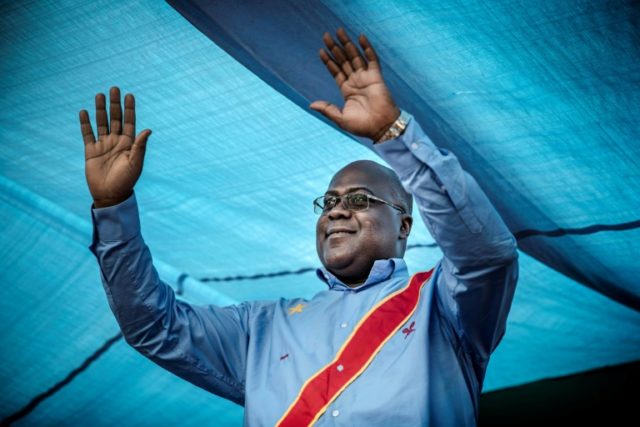The Democratic Republic of the Congo announced the results of its presidential election on Thursday, declaring a surprise victory for opposition candidate Felix Tshisekedi.
Runner-up Martin Fayulu immediately proclaimed the results an “electoral coup.” The Catholic Church questioned the results, as did observers from France and Belgium.
Reuters described the election as “chaotic” and quoted the National Episcopal Conference of Congo disagreeing with the official results. According to the count maintained by the Catholic Church, which deployed 40,000 observers for the election, Fayulu should have won.
The election should mark the first peaceful transfer of power since the DRC became independent 59 years ago. However, Fayulu supporters suspect Tshisekedi made a power-sharing deal with outgoing President Joseph Kabila and was rewarded with a rigged election victory. The party of Kabila, who has held power for 18 years, had a candidate in the race named Emmanuel Shadary who came in third place.
According to the National Electoral Commission (CENI) tally, Tshisekedi won with 7 million votes to Fayulu’s 6.4 million, while Shadary took 4.4 million votes. Shadary went into the election as the favorite to win. Shadary’s prompt and graceful concession, coupled with Tshisekedi’s fulsome praise for Kabila in his victory declaration, fueled the Fayulu camp’s suspicions that a deal was made behind the scenes.
“The Congolese people will never accept such a fraud!” Fayulu thundered to the BBC on Thursday. “Felix Tshisekedi never got 7 million votes. Where did he get them from?”
According to the BBC, the Catholic Church is privately inclined to doubt the results but might not challenge them as strongly as Fayulu would like, because they are wary of “public demonstrations.” This is a delicate way of describing the apprehension over bloody violence in the streets, as occurred in the DRC’s 2006 and 2011 elections. The latest election was delayed due to fears of violence as U.S. military personnel were deployed in Central Africa to protect American assets.
The BBC also mentioned carefully-worded criticism of the outcome from France and Belgium.
“We must have clarity on these results, which are the opposite to what we expected,” French Foreign Minister Yves le Drian urged. His Belgian counterpart Didier Reynders said he could “understand the concerns already being expressed in several places.”
“We’re going to find out what’s going on, of course, and then decide what action to take, and notably around the table at the Security Council,” Reynders said.
The African Union Commission refused to either congratulate or openly challenge Tshisekedi on Thursday, instead urging Congolese to reach a “genuine national consensus.” The AU’s mission to observe the election deemed the process “satisfactory,” but Western nations were not allowed to send observers because the DRC government felt their presence would constitute “meddling.”
South Africa urged the DRC to quickly certify the results and move past the election, while the European Union seems nervous about either endorsing or challenging the outcome.
U.N. Secretary-General Antonio Guterres urged all parties to refrain from violence on Thursday, asking them to “channel any eventual electoral disputes through the established institutional mechanisms in line with the Democratic Republic of the Congo’s Constitution and relevant electoral laws.”

COMMENTS
Please let us know if you're having issues with commenting.